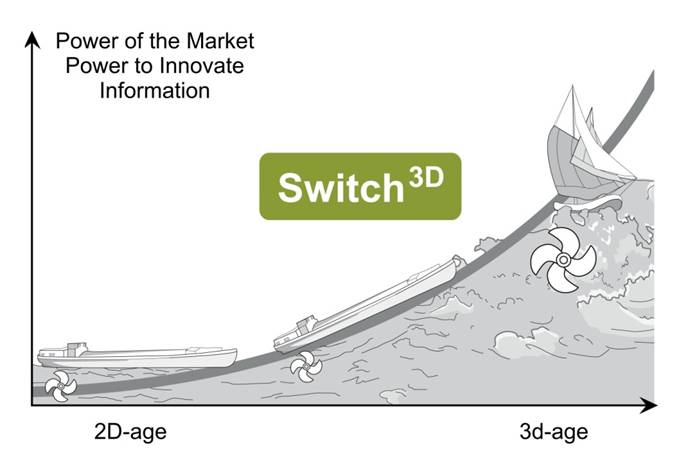Suppose I challenge you with following question: “How do you make your organisation capable of innovating in a very fast and much cheaper way?” What would be your answer as a CEO, business unit manager or HR director?
I’ve learned that, although we have been investing millions in management courses, today a lot of CEO’s and other decision makers are still struggling with making innovation happen. It sounds frightening but maybe we have been investing in old fashioned management models which do not take into account the world of today. This is the same as what happened in the car industry, they also ‘forgot’ to invest in new, energy-efficient models.
This sequence of 6 articles will help you in understanding what’s wrong with today’s “management-thinking” and will challenge you to reflect on possible alternatives. It will become a search for a new balance. A switch from 2D to 3D.
The Information Crisis
In 1978 I graduated as an industrial engineer in telecommunication, but as the years went by I became more and more fascinated by organisational development instead of software development. This resulted in an exciting professional rebirth. My passion for organisational development drove my eagerness to learn. During this learning process I experienced the evolution of the Internet firsthand. Thanks to the internet’s speed increase, the availability of worldwide information sources and the massive introduction of video and social networks, I was able to learn informally and very fast. I still don’t have any formal degree in organizational development.
Because of this enormous access to free and valuable information we are experiencing an “information crisis”. We are facing a crisis in which 2 groups are opposing each other. On one hand there are the passionate and talented people who will use these new sources of information to learn informally and extremely fast. And on the other hand there are those who have lost their passion and eagerness to learn and are stuck in the past. They still have formal degrees but are threatened by people without a formal degree but with more knowledge.
Switch 3D
While writing my book “My Organisation is a Jungle”, I recalled my early school time and my fascination about a colorful historical timeline hanging above the blackboard in the classroom. On this timeline, each period was given a name which was typical for a specific period, for instance the Stone Age, the Bronze Age and the Iron Age. This classification enabled us, not only to describe our evolution but also to see the different crisis’s during the transition from one period to another. During the beginning of every transition a large group of people saw the new period as a treat and a minority saw the same period as an opportunity. This can easily be compared with what’s happening today. Today it is not about stone, bronze or iron, it is about the element ‘information’.

Those companies or organisations who are able to use information very effective and efficient will win the competition. Information leads to creativity, creativity leads to entrepreneurship and entrepreneurship leads to innovation. The biggest challenge for CEO’s and other decision makers is therefore the transformation of their slow moving 2D-organisations to 3D-organisations built to learn and innovate. 2D-organisations aren’t built for passionate people eager to develop and use their talents. 2D-managers in 2D-organisations just don’t have the right competences to develop and handle people that are smarter than they are. 2D-managers are using old fashioned management models.
The chaotic period in which we are living and working today is the fascinating but dramatic transformation zone during which we are switching from the 2D-Age to the 3D-Age. The flat 2D-Age, which is characterized by classroom-teaching, predictable routine and continuous improvement, is slowly making way for the 3D-Age. This is the age in which more and more passionate talents will cause tidal waves of new information and innovation. An age in which regions will compete and collaborate thanks to continuous, fast and durable innovation.
What’s Next?
The answer depends on your attitude towards the growing availability of the element “information”. Are you perceiving this as a threat and do you feel aversion towards this new 3D-World? Or do you look at it as an opportunity and does it itch to shape the 3D-World?
The following 5 articles will go deeper into the various transformation dramas and opportunities which are taking place today. You will get acquainted with the battle between the new management concepts and the old ones.
Step by step it will all get clear to you.



Pingback: Luc’s Thoughts on Organizational Change » Blog Archive » Belgian Media Grinding to a Halt? Big Time.()
Pingback: Luc’s Thoughts on Organizational Change » Blog Archive » Houston we have a SMART problem()
Pingback: Luc’s Thoughts on Organizational Change » Music and Leadership (part 5)()
Pingback: Don’t Fence Me In (Book Review) | Reply-MC()